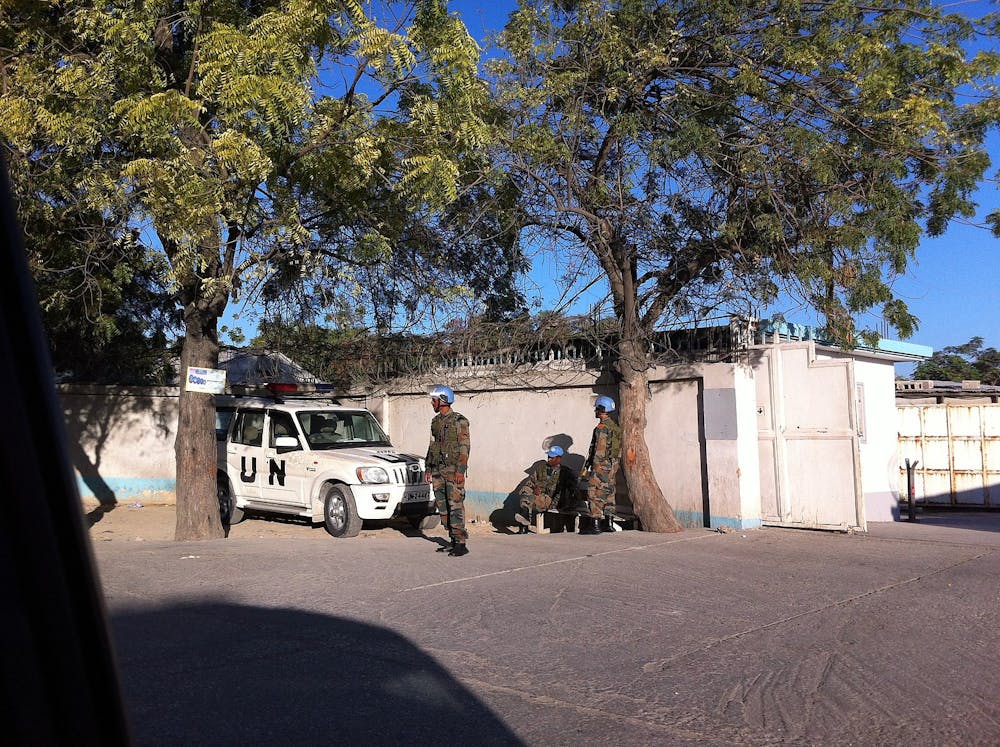By Janjabill Tahsin
Staff Writer
Haiti was approved for a Kenyan-led multinational armed force by the U.N. Security Council on Oct. 2 to de-escalate gang violence in the nation’s capital, according to AP News. The vote marks the first time armed forces are being deployed to the Caribbean country in nearly 20 years since the last U.N.-approved mission.
The resolution drafted by the United States and Ecuador received 13 votes in favor, with two abstentions from China and the Russian Federation, which raised concerns based on Chapter VII of the U.N. Charter's: action with respect to threats to the peace, breaches of the peace and acts of aggression.
“Chapter VII of the Charter of the United Nations was essentially being invoked blindly,” said Vasily Nebenzya, the Russian Federation’s representative. Although his delegation understands the challenges Haiti faces with combating gangs, the lack of information on the mission and its withdrawal strategy have prevented Russia from having enough data to vote on the matter.
China’s delegate, Ambassador Zhang Jun, underscored the unstable government in place and that any external support “can hardly have any lasting effect” without Haitian authorities and all party factions involved reaching the broadest possible consensus on transitional arrangements and coming up with a feasible and credible timetable.
The force will be deployed for one year, with a review after nine months. While a deployment date has not yet been set, U.S. Secretary of State Antony Blinken said, “this mission can deploy within months - and we really have no time to lose.”
The force should arrive in Haiti by Jan. 1, 2024, if not sooner, according to Alfred Mutua, Kenya’s Foreign Affairs Minister. It is not clear how big the force will be, though. Previously, Kenya’s government proposed sending 1,000 police officers. Antigua and Barbuda, Jamaica, Suriname and the Bahamas also pledged to send personnel from their respective countries. Leading civil society groups and rights activists, however, reject the idea of sending United States troops to Haiti because of the “abysmal” history of such deployments.
The vote was held almost a year after Haiti’s acting President and Prime Minister, Ariel Henry, requested the help of international troops to stop the rise of criminal gangs in Haiti with the immediate deployment of an armed force. After the assassination of former President Jovenel Moïse, a power struggle over the Caribbean nation between Joseph Claude and Henry occurred. During this time, inflation rose to 49.3%, which resulted in gangs seizing control of Haiti and its access to food, water and fuel, creating insecurity and critical shortages of fuel.
Hours after the vote, Henry expressed his gratitude towards the U.N. Security Council, the U.N.’s secretary general, Kenya and other countries that agreed to join the force.
The deployment of an armed force is expected to quell the gang violence and restore peace and security to Haiti so it can hold its general elections, which have been repeatedly promised since the July 2021 assassination of Moïse. The U.N., however, has a controversial history of past deployments. In June 2004, a U.N.-approved stabilization mission was marred by the abuse and sexual exploitation of children as young as 12. In Oct. 2010, the first ever cholera outbreak was confirmed in Haiti, which killed nearly 10,000 people 10 months after the catastrophic earthquake that killed over 200,000 people and displaced over 1 million. The mission subsequently ended in Oct. 2017.
Although the resolution cautions that mission leaders take preventive measures, critics of the Kenyan-led mission have voiced their concerns about the accusations circulating about the Kenyan police’s brutality and how they have been long accused of abuse, disappearances and extrajudicial killings that have targeted young men from low-income areas. Kenyan police officers were reported to have shot and beaten hundreds of protesters from human rights groups this year.
The U.S. ambassador to the U.N., Linda Thomas-Greenfield, assured that the resolution contains strong accountability and that Kenya will be able to successfully carry out its mission and support the people of Haiti.







